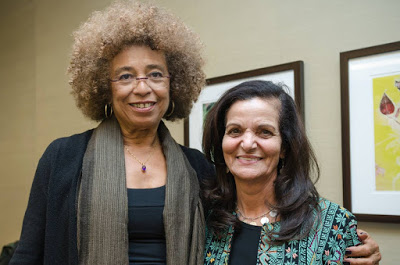Angela Davis and the Jewish Civil War
 |
| Marc H. Ellis – January 13, 2019 |
This is part of Marc H. Ellis’s “Exile and the Prophetic” feature for Mondoweiss. To read the entire series visit the archive page.
This week a political and symbolic drama unfolded, involving the, once again, contentious relations between parts of the Black and Jewish community. Though initially local, the drama has taken on a heightened dimension because it involves one of last living icons of the Civil Rights and Black Power era, Angela Davis. The fireworks continue as I write. In the coming weeks they may escalate further.
The drama began in Birmingham, Alabama, with the Birmingham Civil Rights Institute bestowing the Fred L. Shuttlesworth Human Rights Award on Angela Davis. It is now a national and international spectacle that highlights Israel’s continuing injustice against Palestinian life and land. The Board members of the Birmingham Holocaust Center who protested Davis’s award, and who played a part in the subsequent rescinding of the award, had no idea of what they were getting into. Evidently, they still don’t.
Though the intrigue surrounding the rescinding of Davis’s award may include other constituencies as well, liberal and evangelical Christians who support Israel with few if any questions among them, the local Birmingham Jewish establishment has taken the worst of it. Their objection to honoring Davis is part of a larger political canvas, one that relates to the Jewish civil war over what it means to be Jewish in our time. The central issue in the Jewish civil war? Palestine.
Other issues highlighted by way of Birmingham are important. Historical African American suffering is belatedly being memorialized in the South and elsewhere. It hit a low point with the rescinding of Davis’s award. The Black-Jewish alliance, at least what’s left of it, faces a common challenge of how memorialization works and for whom. When government, not-for-profits, moneyed elites and corporations sanction and finance projects like the Birmingham Civil Rights Institute and the Birmingham Holocaust Center, what is represented and who sets the limits of representation and advocacy is often contested. The Davis Affair hits different sides of the memorialization debate.
The human rights award for Angela Davis was primarily scuttled over her support for the Palestinian cause and the Boycott, Divestment and Sanctions movement emanating from Palestine. As a non-violent strategy, BDS seeks to penalize, even ostracize, Israel for its ongoing abuse of power. The ultimate aim of BDS is to force Israel to change its policies toward Palestinians. The Birmingham Holocaust Center objected to Davis’s award by offering the increasingly contentious connection of the Holocaust and Israel as defining for Jewish and American life. In their view the BDS movement improperly and provocatively singles out Israel for its human rights abuses.
Such Holocaust-Israel-BDS commentary from the Jewish establishment carries a disturbing subtext. Placing Israel in a negative light is viewed as an attack on Israel’s right to exist as a Jewish state. In this view, Jews and non-Jews who support BDS against Israel occupation policies are either self-hating Jews or are anti-Semitic.
Another issue raised in Birmingham is the freedom for African Americans to speak on issues considered by some Jews to be outside their purview and ability to analyze. For Jews of Conscience, how the memory of the Holocaust functions is at stake. Does the Holocaust demand of Jews and others a solidarity toward all those who are suffering, including and especially, the Palestinian people? Or is the Holocaust to be used as a blunt instrument by the Jewish community to discipline those who question Jewish and Israeli abuses of power?
Consider Angela Davis and the Birmingham Civil Rights Institute disciplined on the Holocaust-Israel-BDS front. But, the fight-back is on. Since the rescinding of the award, Davis has spoken forthrightly about the issue of Israel, Palestine, BDS and against the charges of anti-Semitism leveled against her and others who support BDS. Some members of the Birmingham Civil Rights Institute have resigned over the decision to revoke Davis’s award. The Birmingham City Council has unanimously approved a resolution of support for Davis. Jewish groups such as IfNotNow and Jewish Voice for Peace have issued statements supporting Davis and her principled stand on Palestine.
Which side you are on is a tossup in the Jewish civil war. And increasingly in the Black-Jewish alliance as well. The Jewish establishment sees Angela Davis as an enemy. Jews of Conscience see her as an ally.
Stepping into the breach of the Shuttlesworth Human Rights Award conflict is the reconstituted Birmingham Committee for Truth and Reconciliation. They will sponsor an alternative teach-in and discussion with Angela Davis to take place in Birmingham on the date the award ceremony was originally scheduled. Perhaps this will spark a new level of dialogue and accountability for all sides.
Don’t hold your breath though. For the Jewish establishment, the priority is the Holocaust and Israel. Their fear is that a level-headed, justice-oriented, non-violent critique of Israeli power, shorn of anti-Semitism, the very type Angela Davis offers, will bring the state of Israel state to its knees. But what if such a critique brought Israel to its senses?
Perhaps it is a strange twist of fate that a revolutionary Black icon, who has consistently viewed democracy and human rights in an international perspective, may represent a renewed alliance of African Americans and Jews of Conscience on the question of Palestine. Perhaps when Angela Davis arrives in town the Jewish establishment in Birmingham and elsewhere, with their allies, will be forced to recognize that truth and reconciliation applies everywhere and to everyone. Including to Jews – for what Israel has done and is doing to the Palestinian people.


